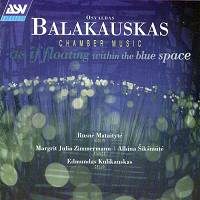|

PROTEST MUSIC

'Snippets of tune are bandied teasingly between the instruments...'
A Lithuanian composer -
with ROBERT ANDERSON

It is an unavoidable fact of a reviewer's life to tackle the task, whatever
it is, at a sitting. This is not only because time presses, which it does,
but out of an omnivorous curiosity. The name of Balakauskas, the Lithuanian
composer born in 1937, was new to me, and the more interesting for that.
Much of his training was at Kiev Conservatoire, where I have had admirable
experience of students. Jazz was an early interest of Balakauskas; Schoenberg
has very obviously supervened, and more recently Boris Blacher. His treatise
Dodekatonika was published in Cracow, where I too have close connections.
When Lithuania gained its independence from the Soviet Union, Balakauskas
became his country's ambassador to France, then Spain and Portugal. It is
touching how important a part musicians played in securing the freedom of
the Baltic States, a tradition that goes back at least as far as Paderewski
in Poland, not to mention the political influence of Verdi in Italy or Liszt
in Hungary.
In the case of this CD I regret not having savoured the pieces in a more
leisurely manner, as my fascination was indeed maintained, but a certain
monotony in the music, though the works recorded here span a period of 30
years ending in 1995, took the edge off my enjoyment. The four listed players
never make more than a piano trio. The pianists, one German, the other Lithuanian,
take turn and turn about, and the first five works alternate between violin
and piano and piano trio. For some unaccountable reason the notes, in English,
French and German, add a cello to the Three Caprices, which are in
fact for piano alone. Bop-Art is indeed for cello and piano. The
players give a virtuoso performance of music that will defy affection for
many a hearing. But advocacy such as this is unlikely to be improved on,
and one can only congratulate the chamber team for negotiating hair-raising
difficulties with such apparent ease and conviction.
The titles to the pieces are descriptive enough, but they too could take
turn and turn about. The first work, Like the Touch of a Sea Wave, for
instance, has three sections, 'As if Floating within the Blue Space', 'Like
the Touch of a Sea Wave', and 'Like Listening to the Oriole's Cry'. I would
defy anyone to make musical distinction here between air, water, or birdsong.
That is not the point: instead there is much to admire in the generalised
impressionistic technique and the ever-imaginative interchange of the two
instruments. Retrospective has two parts. The initial 'Meditation'
is very troubled, with hectic glissandos and fitful ostinatos. Always
there are strong hints of a powerful intellect at work, making intriguing
patterns from the rows and clusters that yet remain elusive. Nine Springs
has an attractive clarity that relies on the subtle use of silences.
The most extended piece is Rain for Cracow, written in 1991 for
a session of the European Commission for Security and Co-operation. The
two instruments indulge in obsessive pattern-making, expanding and contracting
thematic fragments at all possible pitches and in every conceivable combination.
It is a disturbing piece, composed for a city where pollution levels generated
by Soviet industry remained notorious long after the fall of Communism,
producing air that was unbreathable and water that was undrinkable. Bop-Art
is the most recent of the recorded pieces, and refers overtly to Balakauskas's
feelings for jazz. Snippets of tune are bandied teasingly between the instruments,
but there is no escape from the frenetic atmosphere that always underlies
what is essentially protest music.
Copyright © 6 August 2000
Robert Anderson, London, UK
 CD INFORMATION - ASV CD DCA 1063
PURCHASE THIS DISC FROM CROTCHET
<< Music
& Vision home
Vaughan Williams >>
CD INFORMATION - ASV CD DCA 1063
PURCHASE THIS DISC FROM CROTCHET
<< Music
& Vision home
Vaughan Williams >>
|

